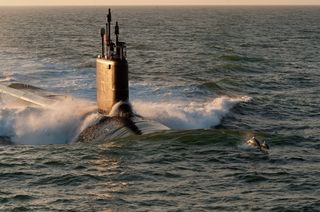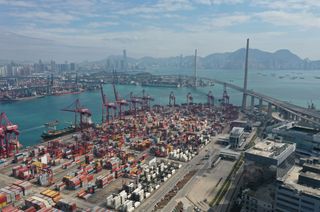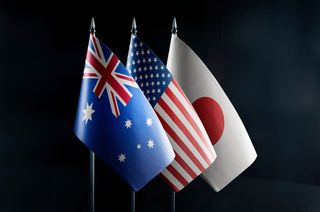The Australian
By Tom Switzer
During his only visit to Australia, Vladimir Putin had a pleasant exchange with John Howard.
It was at the APEC summit in 2007 and the then prime minister told the former KGB agent some fascinating trivia: that Alexander Kerensky — Russia’s moderate leader who was overthrown by the communists in 1917 — had married an Australian reporter and lived in Brisbane in the mid-1940s.
Putin was flabbergasted — not because the deposed Russian leader had lived in (of all places) Queensland but because he had the audacity to marry a journalist! “Probably it was just another mistake in a line of mistakes made by him,” he quipped.
If Putin meets Tony Abbott in Brisbane next month, relations won’t be so jovial, and not just because his G20 host is a former journalist. The Prime Minister’s warnings that he will “shirt-front” Putin reflect community sentiments. But they also mean any dealings with the Russian President will be as frosty as a Siberian winter.
The source of tensions, of course, is the downing of Malaysia Airlines flight MH17 over Ukraine that led to the deaths of 298 people, including 38 Australians. Governments throughout the world, including our own, immediately responded to this tragedy by condemning the Ukrainian separatists for failing to co-operate with international investigators and by escalating the economic sanctions against Russia that had been applied following its takeover of the Crimean peninsula in March.
But while the events of July 17 are deeply abhorrent to us, we should bear in mind that the downing of the passenger jet was probably an accident in a war zone. Moreover, we should put this seven-month standoff in a broader historical context and try to understand it from Russia’s perspective. If we fail to do so, the West risks further isolating Moscow and courting its animosity, which is not in our interest.
Banning Putin from the G20 would have been counterproductive. The point of such international institutions is not that they are a reward for good behaviour but that they provide a forum for dealing with common problems. The West needs Russia’s help to secure a nuclear deal with Iran. Washington requires Moscow’s co-operation to withdraw US equipment from Afghanistan through Russian territory. Just this week Secretary of State John Kerry said Washington and Moscow had agreed to share more intelligence on the Islamic State terrorists.
Remember it was Putin who bailed out Washington and London last year by promoting the deal under which the Assad regime in Syria agreed to jettison its chemical weapons, thereby avoiding the airstrikes that Barack Obama and David Cameron had threatened. Had Damascus fallen, jihadists would have filled the power vacuum.
Escalating sanctions on Russia’s financial, energy and defence sectors drives Moscow closer to Beijing and hurts the European economy. No doubt German Chancellor Angela Merkel, notwithstanding her public utterances to the contrary, is looking to end the tit-for-tat sanctions stoush with Moscow sooner rather than later. After all, the German economy, which has anchored the rest of the eurozone in recent years, is in danger of slipping into recession largely because of the escalating European trade war.
For Australia, the prospect of the US getting bogged down in Europe dealing with Ukraine while also fighting Islamic State in the Middle East could undermine the so-called pivot that promotes stability and prosperity in Asia. That is not to our advantage.
There is another important reason the West should stop poking at the Russian bear, one that has been put forward by Paul Keating. In 2008, the former prime minister warned: “Russia is the only country in the world with the capacity to massively damage the US to the point of seriously maiming it. And ditto for western Europe.”
Keating asked: “Wouldn’t you think that when the Russians surrendered their empire in 1990, US policy would have been adept enough to find an intelligent place for them in the overall strategic fabric?” Instead, Washington “ring-fenced Russia, treating it as a virtual enemy, with its western European and central European clients egging it on”.
Keating was right: from Russia’s standpoint, the expansion of NATO and the EU to the frontiers of the former Soviet Union, culminating in attempts to pull Ukraine and Georgia away from what Moscow has long deemed as its sphere of influence, was bound to cause big trouble. Indeed, the Russians said just that on numerous occasions.
The accepted wisdom is that Putin is bent on creating a Russian empire akin to the former Soviet Union.
The reality, as Keating foreshadowed, is that the Kremlin’s conduct has been largely defensive. Its military incursion into Crimea, home of the Russian Black Sea Fleet, was a rational response to the Western-backed coup to topple a democratically elected, pro-Russian government in Kiev on February 22.
Many Australian politicians, most notably Bill Shorten, have been swift to criticise the decision to accommodate Putin at the G20 but have offered no plausible alternative policy. Instead, the Opposition Leader has tended to indulge in the rhetoric of moral indignation, to treat Putin as a pariah in world affairs and to advocate Russia’s isolation, which many EU states are unlikely to sustain.
This may be good politics, but it is an abdication of statesmanship.
Put it this way: why should Australia, a regional middle power with a population of 23 million, pick a fight with a nuclear-armed great power that deems its vital strategic interests are at stake in its near abroad?
A sound policy demands both condemnation of the Russian-backed rebels responsible for shooting down the Malaysian passenger jet and an acknowledgment that the West continues to share many interests with Moscow. Dealing with Putin at the G20 realistically is essential for making sure these interests are served.
This article was originally published at The Australian




